#queemes
Text

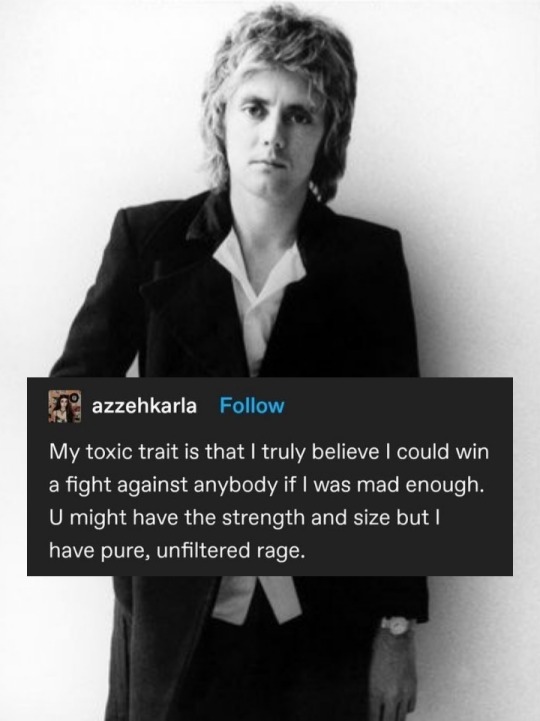


Queen's Toxic Traits
179 notes
·
View notes
Text
we talk about image quality in this fandom but I also genuinely love the way people blog in relation to whichever band member(s) they're the most feral about -- and I count myself in that fully
because I will add a comment to a photo like 'oooeeeee 👁️👄👁️ look at john here'
and the photo will be something like
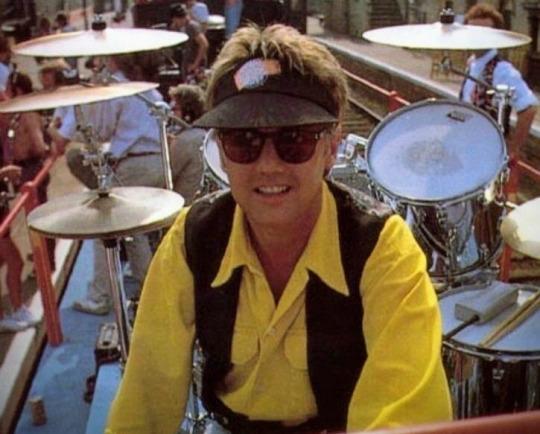
#an utterly wonderful front-and-centre roger and the mike wazowskiest portion of a bassist you have ever seen#fhajxbsgsh#rog does look seriously glorious here#i could do with the visor and sunnies myself just to look at him#and not just because of the yellow shirt#ANYWAY I'm all about the queen biases#everyone's comments on the minutiae give me life#like i can't help but look at that picture and think 'john is like that iasip meme where mac is staring at charlie across the restaurant'#i can't help it!!!#so i love seeing what other people pick out#queemes
26 notes
·
View notes
Text
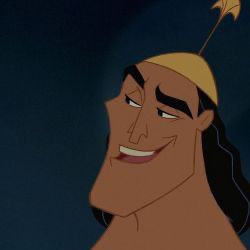
😧❤️💜
#queen band#freddie mercury#john deacon#brian may#roger taylor#deaky#bri#bohemian rhapsody#fred#deacy#rog#rami malek#queemes#meme#farrokh bulsara#joe mazzello
0 notes
Text
i fucking love how wilhelm took the power he was forced to have and used it all to burn the system down and declare in front of everyone he’s whipped for simon eriksson
#you go girl#honestly i’m so fucking proud#he is taking the happiness he deserves#also the way he told the queem you sent me to therapy. like you brought this upon yourself#you slay king#young royals#young royals spoilers#simon eriksson#prince wilhelm#wilmon#wilhelm x simon#edvin ryding#omar rudberg
3K notes
·
View notes
Text
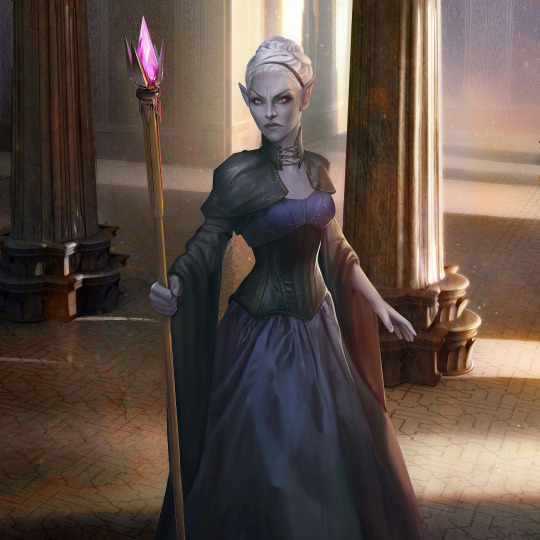
Queen Mother Barenziah
Art for The Elder Scrolls: Legends
*Artist Unknown* If you know the artist, comment below!
65 notes
·
View notes
Text
Emma: How did you get a table? i thought they were fully booked!
Regina: *Looks at whimpering staff in the corner*
Regina: I can be very persuasive.
#i alr did this with belle and rumple but i feel like it also applies with them so#ouat emma swan#emma swan#emma ouat#swan queem#jennifer morrison#mills x swan#swan mills family#regina x emma#emma x regina#the savior#regina mills#ouat regina#incorrect quotes#swan queen incorrect quotes#lana parrilla#storybrooke#the enchanted forest#ouat#once upon a time#ouat humor#ouat incorrect quotes#ouat fandom#incorrect ouat quotes#ouat headcanon#ouat headcanons#ouat crack#funny ouat#ouat humour#ouat characters
137 notes
·
View notes
Text


the movie sucks but at least the villain is hot
#fanart#pencil art#traditional art#doodle#disney fanart#disney wish#wish 2023#king magnifico#queem amaya
76 notes
·
View notes
Text
dont forget to be feral for sabine or ydris today
43 notes
·
View notes
Text
i made this in about 10 minutes on a whim and it was the dumbest thing i ever did but somehow its SPOT ON
i put the original image for reference lmao

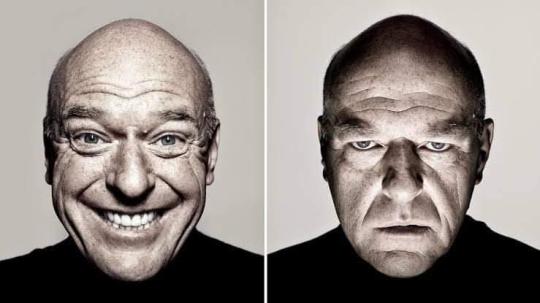
#queen#queen band#roger taylor#queeme#this is gonna haunt me at night#they're all staring into my goddamn soul
30 notes
·
View notes
Text



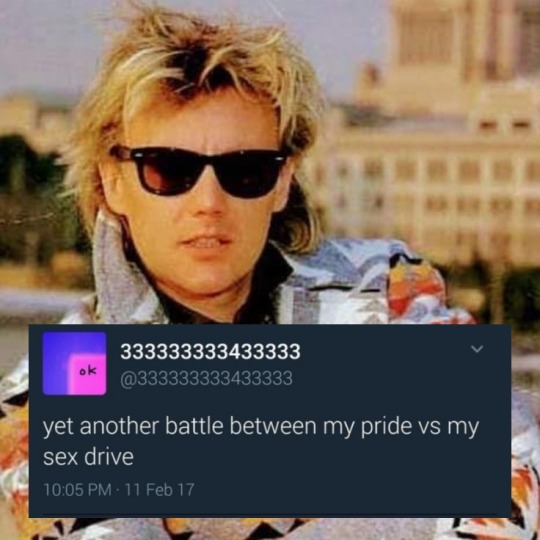
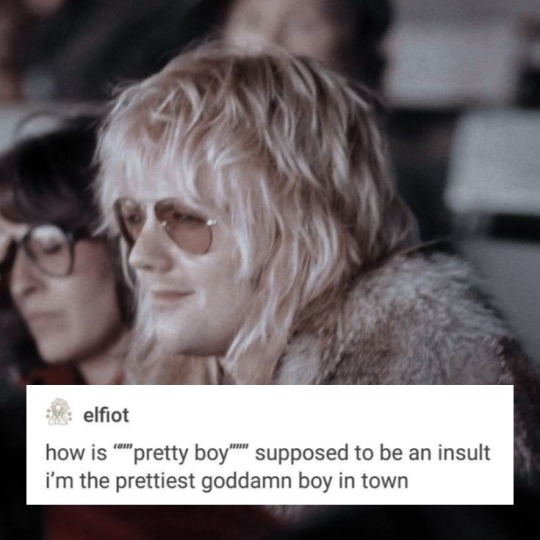
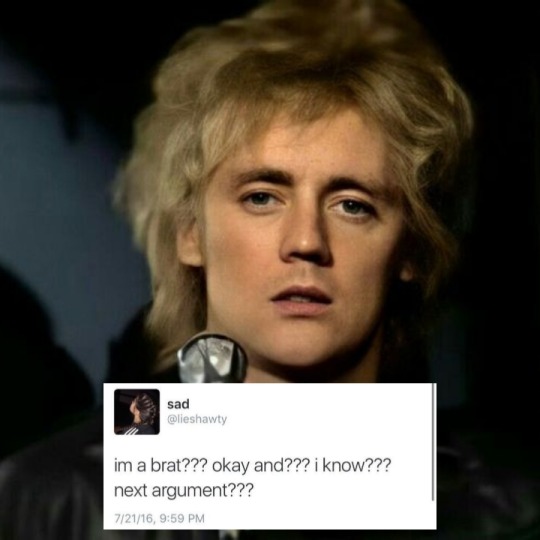


Queen as Text Posts (8/?)
"Oops All Roger" edition
115 notes
·
View notes
Text
back chat john deacon plus iwtbf john deacon is grandma swagg from the cops and the robbers by janet and allan ahlberg yes I will elaborate--

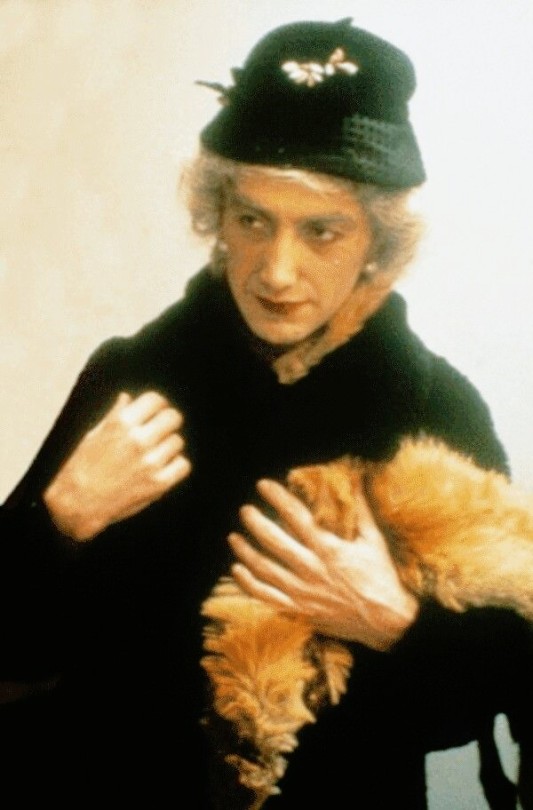
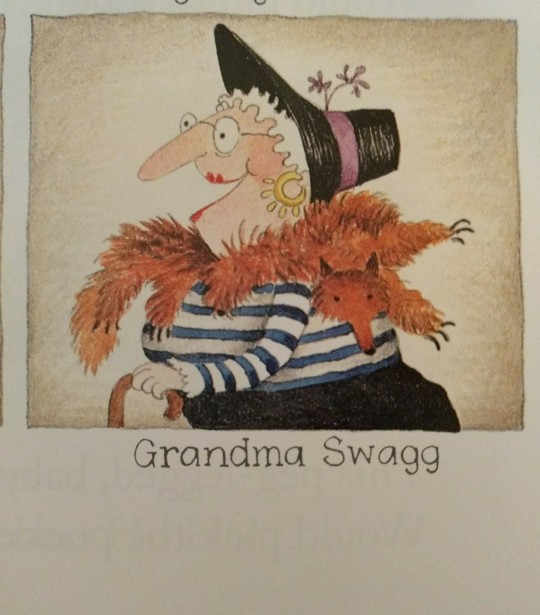

26 notes
·
View notes
Text
random images i have saved on my phone - day 13

(not mine) pov: you say that the sun is a planet
#brian may#queen#queen band#1970s#1980s#1970s music#1980s music#queeme#cursed image#daily cursed image
15 notes
·
View notes
Note
H and J queem 👑👑👑👑
MY QUEEM! I miss your face.
H: How would you describe your writing style?
... structured? Like, I am a planner. I set up the play and then I take it. Even if no one else knows or sees the links and the narrative lines, I know they're there. I'm also a prose girlie and I love describing a scene and putting the reader in it.
J: What’s your favorite fanfic trope? Have you written it?
Answered here
Fanfic writer A-Z asks
3 notes
·
View notes
Note
Hey, I was wondering what you think of Queem/Quiem McMann from Choujin X? He hasn’t had much screen time besides a couple flashbacks, some lore dumps and a few quotes, but I think he’s already very interesting. His quote that states that humans only have one real emotion being fear (which implies he was extremely fearful) and the fact that he has a similar obsession with weapons and violence makes him sound like a parallel to Azuma, perhaps the Zora to Azuma’s Tokio.
As well, you’ve often analysed the series from a Nietzsche lens, and I think Quiem is by far the most overtly Nietzschian character. He outright refers to himself as the Ubermensch of War (in his backstory page in a volume extra), comes from a Choujin (supermen) supremacist country and doctrine and even explicitly hates God and religion enough to commit terror attacks on the clergy. I think his rivalry between Zora has very interesting connotations from a Nietzsche pov. Both are Choujin supremacists who treat Choujin as having more of a right to live and be free than humans, but while Quiem sees the Choujin as having moved past the need for God, Zora and her followers think the Choujin are the very manifestation of God

Hello, sorry for taking some time to think this over but I believe I'll be even better able to answer this question in light of what we learned in this most recent chapter. You're right in that Queem seems to be a heavily important character to both the lore and the themes of the series. I discussed the religious angles of his character and Zora on another post, but there's still more to be said about Queem as an embodiment of war.
Historically, Queem seems to have started what was this world's equivalent of the world wars, especially in the Asian pacific theatre. However, instead of speaking on the world war two allegory that seems a bit obvious, I think there's an interesting analysis in regards to the intersection of nihilism and the "great man theory."

Rather than looking at Queem as an allegory for Hitler, let's look at him as a napoleon instead, someone often mentioned in the same sentence as Julius Caesar. Instead of looking at Nietzsche's words himself though, there are other works of literature written in Nietzsche's time when political nihilism was becoming a prevailing philosophy of thought.
Crime and Punishment is written by Russian author Fyodor Dostoevsky, it depicts aman who murders a pawn shop owner with an axe, and the only witness to the crime. After committing the murder, Raskolnikov goes on to justify this murder along nihilistic philosophy lines that his actions can't be judged as good or evil for many reasons.
His most famous theory to justify the murder is that he divides the world into extraordinary people, such as Solon, Ceasar and Napoloen, and ordinary people who simply serve to propagate the species. Extroardinary people, he theorizes, must have "the right to transgress" or progress would be impossible.
“No, not exactly because of it,” answered Porfiry. “In his article all men are divided into ‘ordinary’ and ‘extraordinary.’ Ordinary men have to live in submission, have no right to transgress the law, because, don’t you see, they are ordinary. But extraordinary men have a right to commit any crime and to transgress the law in any way, just because they are extraordinary. That was your idea, if I am not mistaken?”
“What do you mean? That can’t be right?” Razumihin muttered in bewilderment.
Raskolnikov smiled again. He saw the point at once, and knew where they wanted to drive him. He decided to take up the challenge.
“That wasn’t quite my contention,” he began simply and modestly. “Yet I admit that you have stated it almost correctly; perhaps, if you like, perfectly so.” (It almost gave him pleasure to admit this.) “The only difference is that I don’t contend that extraordinary people are always bound to commit breaches of morals, as you call it. In fact, I doubt whether such an argument could be published. I simply hinted that an ‘extraordinary’ man has the right… that is not an official right, but an inner right to decide in his own conscience to overstep… certain obstacles, and only in case it is essential for the practical fulfilment of his idea (sometimes, perhaps, of benefit to the whole of humanity).
Queem's belief mirrors Raskolnikov's own, that Choujin because they are superior, have the right to transgress over others in pursuit of a greater goal. Which is why I say you can compare him to a napoleonic figure, believing he has the right to start a war in order to make france a great nation. A figure in history who threw the whole world into a series of chaotic wars, was praised for their military genius, only to ultimately lose.
There is a scene in another Russian novel by Leo Tolstoy named War and Peace, which tackles this similiar Great Man Theory in regards to Napoleon. A main character enters the war out of his admiration for Napoleon who he considers to be a military genius, only to come across him at the end of a terrible battle and realize how small of a man napoleon really is.
“Voilà une belle mort,” said Napoleon, looking at Bolkonsky.
Prince Andrei understood that it had been said about him, and that it was Napoleon speaking. […] But he heard these words as if he was hearing the buzzing of a fly. He not only was not interested, he did not even notice, and at once forgot them. […] He knew that it was Napoleon— his hero— but at that moment, Napoleon seemed to him such a small, insignificant man compared with what was now happening between his soul and this lofty, infinite sky with clouds racing across it.
I think Queem as a character exists to explore two questions, do Choujins because of their power do bear the right (or even the burden) to transgress, and do their powers, or actions, or genius, or whatever you might believe them to have make them more significant than other people?
This is where we get to the obvious parallels between Azama and Queem's character, as obsession with war and inherent greatness are ideas that run deep down into Azama's psyche. When he raises with his choujin powers for the first time, it's accompanied by knives, guns and tanks, the same kind of warfare imagery we always see go hand in hand with mention of Queem.

A lot of Azuma's motivation comes from following his own personal philosophy of justice, his desire to be a great enforcer of law like his father the policeman.

The quote about two people always, inevitably going to war with each other comes from Queem and it was used to describe Azuma's relationship with Tokio.

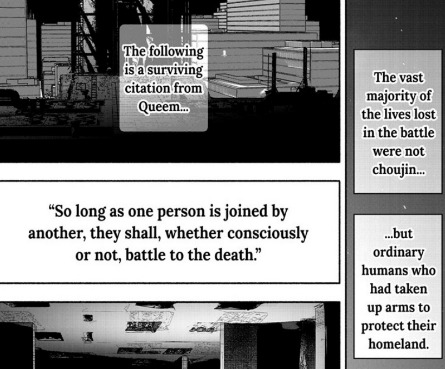
Azuma's deepest motivations are well described by these two quotes. Number one his secret fear / insecurity that Tokio is the kind of great man that Azuma wants so desperately to be, which is why he's always living in fear of Tokio surpassing him and clings to the pedestal that Tokio puts him on. Number two, his desire to go to war in general.
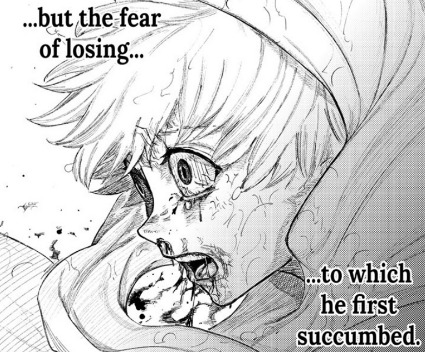
Azuma from the start wanted to become something like a choujin, to transform into something greater and do something with his life because he was lacking in something.
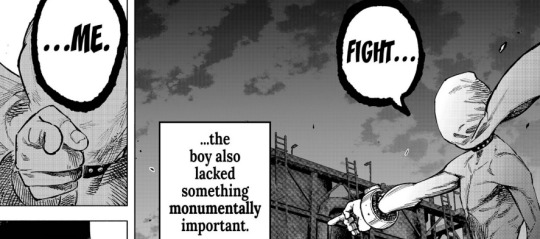
Azuma seems to embody these two sides of Queem. Queem is the kind of person that Azuma is striving to be, a great man of history. Azuma deliberately seeks out war in order to prove himself, the way that Queem threw the entire world into war to prove the inherent greatness of him and the choujin surrounding him.
While striving for larger than life ideas they are both also, like Napoleon in War and Peace shown to be rather small. Azuma's driven by a combination of fear of other people and his inferiority complex.
With what we learn about Queem to his ending was rather pathetic. He never conquered or held onto any territory after the war he started, and he died right in the middle of it. He also died as an opium addict after having lost all of his humanity and even the ability to change back.
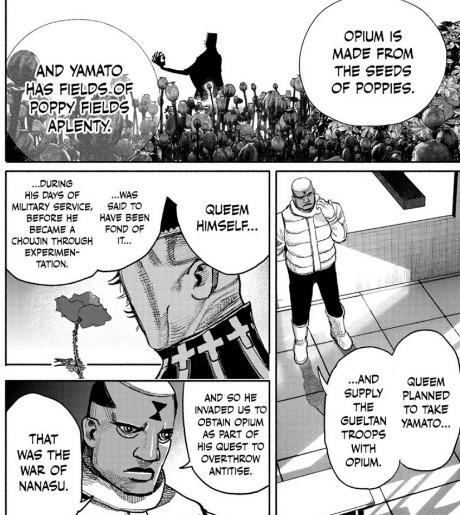
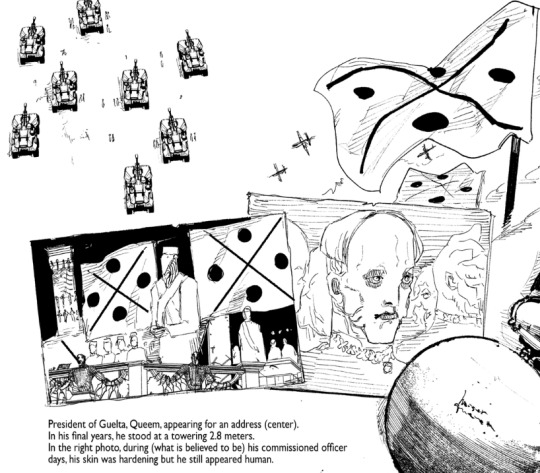
In striving to be something greater than human, Queem ends up falling down into something less than human and losing everything. Which seems to be the same dangerous path that Azuma is now walking in his attempts to strive for a greater ideal of justice.
14 notes
·
View notes
Text
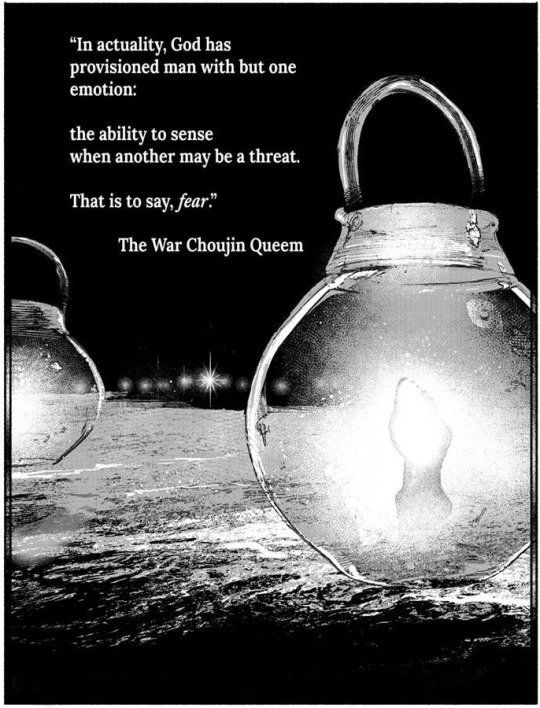
Choujin X
Sui Ishida
#choujin x#sui ishida#manga#mangacap#seinen#action#drama#supernatural#quote#fear#war choujin#queem#lantern#monochrome
11 notes
·
View notes
Text
Emma: man sure is dark in here.
Regina:
Emma: i'm not scared or anything.
Regina:
Emma: i mean who is scared of the dark these days? not me no sir.
Regina: do you want me to hold your hand?
Emma: yes please.
#incorrect quotes#Emma Swan#Regina Mills#regina x emma#emma x regina#emma swan#regina mills#Swan queem#Swanqueen#swan queen#madam mayor#ouat fandom#once upon a time#ouat incorrect quotes#ouat#incorrect ouat quotes#ouat humor#ouat headcanon#the evil queen#the saviour#ouat headcanons#emma swan headcanons#regina mills headcanons#the enchanted forest#Story brooke#swan mills family#enchanted forest
159 notes
·
View notes